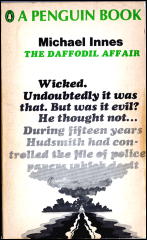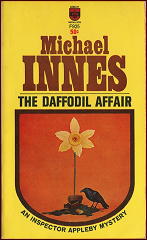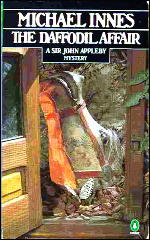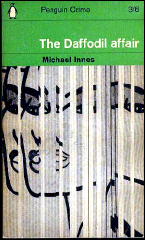Sun 10 May 2009
MICHAEL INNES – The Daffodil Affair.
Victor Gollancz, UK, hardcover 1942. Dodd Mead, US, hardcover, 1942. Reprinted several times, including the following: Berkley F925, June 1964; Penguin, several editions, both in the UK and the US.

You might want to go back and read my review of Innes’s Seven Suspects first, as I’m going to go out on a limb here, and say that that book is a lot more representative of both Michael Innes and Inspector John Appleby than The Daffodil Affair is, and by a long shot — by factor of, in fact, say several thousand times or so.
I have to stop and tell you the truth right here, before going on any farther. I have never read a mystery or detective story that is ANYTHING like this one. In terms of being unique, this one’s the ultimate in uniqueness.
Have I intrigued you? I hope not, because my intention at this point is NOT to convince you to read this book. I don’t intend to have you NOT read it either. You do need to know, perhaps, what’s in store for you if you read this book, and well, I’ll do my best.
I’ll start, though, with a long passage from page 89 of the Penguin edition. The setting is both heading down a river [the Amazon?] to a secret encampment where a man named Wine is making a collection of animals, people and even inanimate objects with psychic powers:

A witch and a girl possesed by demons [named Lucy, her demons being her multiple personalities] were exhibits more ‘period’ still.
In fact — said Appleby to himself as he paced the blacked-out deck once more — this ship has the nineteen-forties dead astern and is heading for the past at its full economic speed of eighteen knots. The Time Ship: master, Emery Wine [the man who has kidnapped all of the above, all with psychic abilities, not including Appleby and Hudspith]. It sounded like H. G. Wells… He took several turns about the deck and returned to the smoke-room.
Hudspith’s voice greeted him as he entered. […]
Hudspith, though still talking defiantly, was looking at the silent Wine and Beaglehole [Wine’s assistant in crime] with an occasional furtive sideways glance — as a man may do who is presently going to realize that he has been making a fool of himself. ‘There was a girl in London,’ said Hudspith, raising his voice with a sort of desperate and fading arrogance. ‘Just a few months ago. Lucy, her name was…’
Rather abruptly Appleby plumped down on a settee. Perhaps he had been dull. Certainly he had not realized it was all heading for this.

The book, written during the darkest days of World War II, is perhaps (I am not quite sure) a reaction to Science, which had at that time nearly brought England to its knees — very dark days indeed. Can the uncanny also move the world? Wine soon intends to try.
Here’s another long quote, this time from page 177. Appleby and Hudspith are essentially prisoners somewhere on an island in South America. Hudspith speaks first. (I’ll leave out one key, essential part, but I think you may find the rest amusing)
Appleby yawned. ‘Hundreds, I should imagine.’
‘Quite so – and some of them have written scores of books. Folk with intelligences ranging from moderate through good to excellent. A couple of women are quite excellent; there’s no other word for them.’
‘Is that so? I say, Hudspith, it must be deuced late.’
‘And, what would you say those hundreds of folk are constantly after?’
‘Money.’ Appleby’s voice, if sleepy, was decided.
‘They’re constantly after a really original motive for murder. And here one is. […] It’s a genuinely new motive, and none of them has ever thought of it.’
‘Probably someone has. You just haven’t read that particular yarn. Good night.’
‘But I haven’t explained what I mean. About waste that is.’ Hudspith’s voice continued to come laboriously out of the night. ‘Here is a perfect detective-story motive, and yet we’re not in a detective story at all.’
‘My dear man, you’re talking like something in Pirandello. Go to sleep.’
‘We’re in a sort of hodge-podge of fantasy and harumscarum adventure that isn’t a proper detective story at all. We might be by Michael Innes.’

‘Innes? I’ve never heard of him.’ Appleby spoke with decided exasperation. ‘You might employ your last hours more profitably than in chatter about the underworld of letters. Go to sleep. Go to sleep and dream of the nice boiled egg they send to the condemned cell on the fatal morning.’
Hudspith sighed and for a time was silent. ‘It’s all very well rotting,’ he said at length. ‘But about this idea of Lucy’s — do you think it will work?’
Silence answered him.
Bear with me. Here’s the last of the quoting I’ll be doing. I’ll also let it be the end of this review. If at the end you still want to read the book, I’ll allow you, but keep in mind, the decision is yours. This passage comes from page 43, when Daffodil was still a key component of the story. Appleby has found Mr Gee at the livery stable from which the horse has been stolen:
‘It so happens,’ said Mr Gee with dignity, that I’m not a showman. But if Daffodil is valuable the way you suggest, then you know something about them in whose hands he was before. They weren’t show people, or they wouldn’t have let him go.’
Appleby got up. ‘Mr Gee, you ought to have taken to my profession.’
There’s compliments you can return,’ said Mr Gee, ‘and there’s compliments you can’t.’
May 10th, 2009 at 10:25 am
Innes, like Christie and Allingham, occassionaly left the classical detective story aside for these ‘extravaganzas’. The Big Four and Passenger to Frankfurt by Christie, Gryth Challice Mystery and The Mind Readers by Allingham, and in Innes case several books (with and without Appleby) like The Journeying Boy and Operation Pax.
This one reminds me a bit of Buchan’s Gap in The Curtain, in that it’s not meant to be taken seriously (not that any of Innes Appleby novels are meant to be taken too seriously), though not exactly an allegory: books in this sub-genre are meant as philosophical mysteries, closer to Chesterton’s The Man Who Was Thursday than what we think of as the classical detective story.
Written when the outcome of the war was far from a certainty, the book is clearly meant as a sort of intellectual escapism, and might also have been a comment/reply to the well known Nazi occultism. Innes may have been commenting on the dangers of science, or as likely pointing out the dangers of occultism. Since in real life he was a noted Oxford don (J.I.M. Stewart, and author of many novels under his own name)it’s not unusual for him to indulge in a little intellectual game playing.
I like Innes, but you could never call the Appleby books strict realism even in their most straitlaced form. At one point Appleby, a Yard man, delines to look at the body because he might have to give evidence about it. Innes is cheerfully, even defiantly, uninterested in the actual workings of either the Yard or crime investigation and Appleby is as close to an amateur sleuth as a professional policeman can be.
There is a strong strain of the fantastic among the British writers of the twenties and thirties. The whole pre war business with mediums, Theosophy, the Golden Dawn and other such movements lingered on in the post war era usually expressed in fiction. This was also the era of Charles Williams (the British, not the American one) religious thrillers, Sax Rohmer, the early Dennis Wheatley occult thrillers, Jack Mann’s Gee’s thrillers, and novels like Dorothy McArdles The Uninvited. This one is clearly in that mode, and as you say readers should be warned. If you know what you are in for you will probably enjoy it, but if you go in blind expecting a normal detecive novel of the era you might be shocked by what you find.
May 13th, 2009 at 7:32 pm
I was hoping to hear from a few other readers about their reaction to this book, but I think you’ve summed things up very nicely, David.
Based on your comments, perhaps I’ll have to revise my thinking about Appleby, whose books I’ve always intended to read more of, but so far I haven’t.
I’ve always thought of him as a traditional type of fellow from Scotland Yard, but from what you say, I seem to be wrong about that.
— Steve
May 16th, 2009 at 2:19 am
Appleby is far from traditional and the Innes books not police procedural by any means, certainly not in the manner of Henry Wade, Roy Vickers, or even John Creasey. Humor plays a large role in enjoying them, and in later books there is apt to be a bit of adventure as well, often in the Buchan tradition. I don’t think you could call Appleby an ordinary Yard man by any stretch. Innes books after 1950 are bit more sober in mood and delivery, but far from realism regarding the Yard.
At their best the irony, social criticism and humor are balanced by fair puzzles and good (if sometimes lucky) detection by Appleby. Among ones I would recommend, Hamlet, Revenge!; The Journeying Boy; One Man Show (perhaps his masterpiece); The Man From the Sea; Death at the President’s Lodgings (his first); The Secret Vanguard; Operation Pax; Hare Sitting Up; Appleby on Ararat; The Weight of the Evidence; The Long Farewell; The New Sonia Wayward; and A Family Affair, not all featuring Appleby. In addition Innes wrote Candleshoe which became a Disney film with Jodie Foster, David Niven, Leo McKern, and Helen Hayes.
Over the years Appleby is knighted and joined in his adventures by his artist wife Judith and his grown son. Innes also wrote several books about artist sleuth Charles Honeybath.
You should be warned though that Innes is apt to indulge in what Barzun and Taylor refer to as ‘Henry James grammactical binges,’ so depending on your tolerance for that sort of thing be on guard. He was, in real life, a don at Christ Church College, Oxford who Tutored in English and wrote on character and motivation in Shakespeare and on Kipling. We are a long way from Edgar Wallace or Inspector French, and even Superintendent Wilson. Naturally academic setting occur frequently and murder tends to happen whenever Appleby shows up as a guest to the point that, like Jessica Fletcher, it’s a wonder anyone invites him anywhere.
May 2nd, 2010 at 9:09 pm
I have mixed feelings about Innes. His first four novels (DEATH AT THE PRESIDENT’S LODGING; HAMLET, REVENGE!; LAMENT FOR A MAKER; and STOP PRESS) are all superb, and he wrote some excellent works in the 1940s (DAFFODIL, WHAT HAPPENED AT HAZELWOOD, FROM LONDON FAR). He then proceeded to sit on his laurels for the next half-century, and produced only one work of note after 1948’s A NIGHT OF ERRORS – the Ilesian comedy, THE NEW SONIA WAYWARD (not detection). Most of his post-WWII novels are thrillers, while his detective stories are trivial, insubstantial, and wholly artificial.
I would certainly rank him well below Nicholas Blake, who integrated sharp characterisation and a literate style with ingenious plots and solid detection; as COC says, “he never shirks clueing and thinking”.
That said, I am looking forward to Crippen & Landru’s new collection of his short stories.